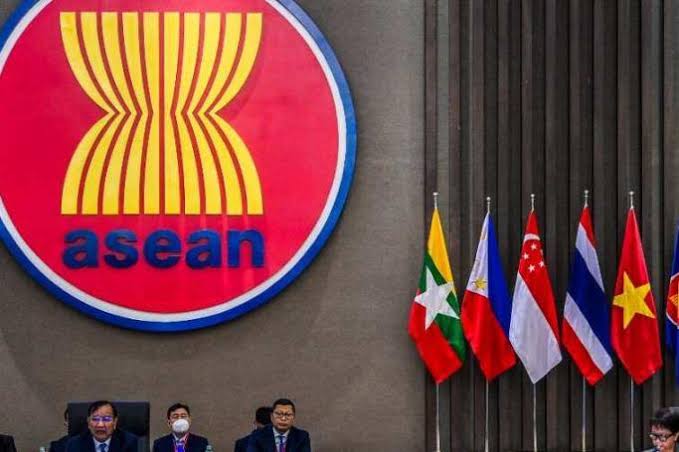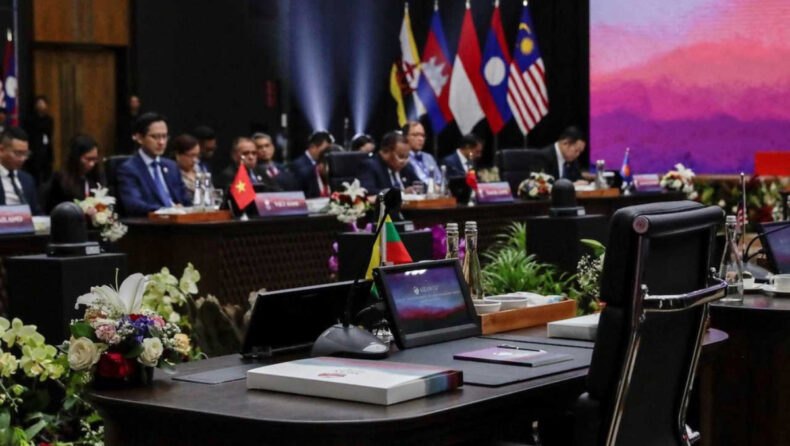Foreign ministers from the Association of Southeast Asian Nations (ASEAN) have gathered in the Indonesian capital this week for a pivotal meeting. The primary focus is a comprehensive reevaluation of the regional bloc’s peace plan for Myanmar. This meeting assumes even greater importance as frustration continues to escalate over the unceasing violence and political upheaval in Myanmar, which has persisted for over two years since the military coup in 2021.
Table of Contents
The ASEAN Diplomatic Gathering
The meeting, hosted by Indonesia in its role as the chair of ASEAN, constitutes a comprehensive platform for discussions on a diverse array of topics. These include addressing the ongoing crisis in Myanmar, crafting a code of conduct for the South China Sea, addressing regional economic concerns, and combating transnational crime. It’s worth noting that Myanmar, despite its military rulers’ exclusion from top-level ASEAN gatherings since the 2021 coup, retains its membership within the regional organization, adding complexity to the discussions.
The Elusive Peace Plan
At the heart of the deliberations is ASEAN’s five-point consensus, a peace plan crafted to address the Myanmar crisis. This consensus advocates for an end to violence and the initiation of a dialogue involving all relevant parties. However, since its inception, the Myanmar military junta has largely paid lip service to these principles, prompting concerns about the plan’s effectiveness.
Indonesian Foreign Minister Retno Marsudi, in her opening remarks, emphasized the importance of the five-point plan and expressed the need to comprehensively review its implementation. She highlighted that ASEAN’s unity and strength are contingent on achieving a peaceful and enduring solution to the Myanmar crisis.
ASEAN’s Credibility at Stake
The ongoing crisis in Myanmar has led to questions about the unity and efficacy of ASEAN, an organization founded during the height of the Cold War in the 1960s. ASEAN’s longstanding principle of non-interference in each other’s internal affairs and consensus-based decision-making has posed challenges in resolving crises like Myanmar’s. The organization has been unable to exert substantial pressure on the Myanmar military beyond excluding them from high-level meetings.

Indonesia, recognizing the growing skepticism surrounding ASEAN’s credibility, has been engaged in diplomatic efforts behind the scenes to seek a resolution to the Myanmar crisis. However, tangible progress has been limited.
A Multilateral Gathering
Following the ASEAN foreign ministers’ meeting, leaders from ASEAN member states and partner countries, including the United States, China, Japan, South Korea, Australia, and others, are scheduled to convene in Jakarta later this week. The absence of President Biden underscores the complexity of U.S. engagement in Southeast Asia, as Vice President Kamala Harris assumes a central role in the discussions.
Chinese Premier Li Qiang is expected to participate in these discussions. Chinese Premier Li Qiang’s presence carries its own significance, as China plays a pivotal role in Myanmar’s political and economic landscape. China’s influence in the region will be closely watched amid concerns of its alignment with the Myanmar military junta.
The Road Ahead
As the ASEAN meeting unfolds, the world awaits tangible outcomes and signs of progress toward a peaceful resolution in Myanmar. The stakes are high, not only for the people of Myanmar but also for the credibility and relevance of ASEAN as a regional organization. The diplomatic challenges posed by the Myanmar crisis underscore the complex nature of multilateral diplomacy in a rapidly changing world.













